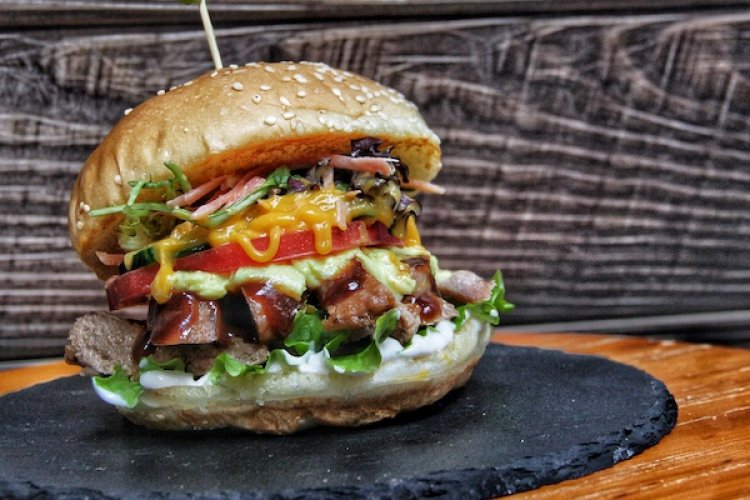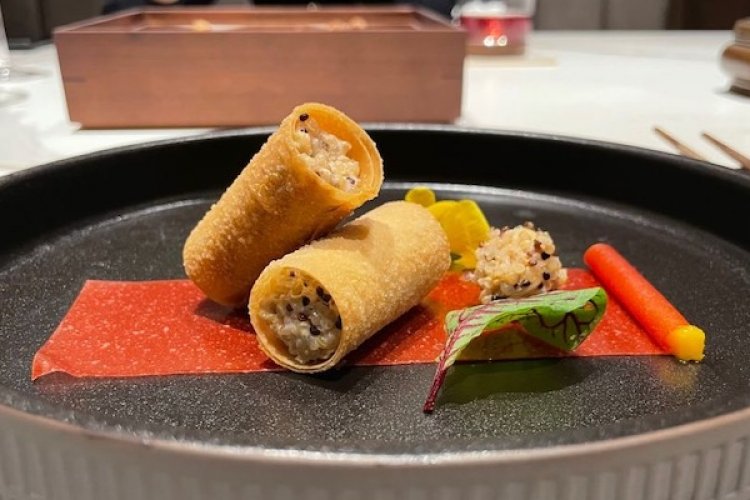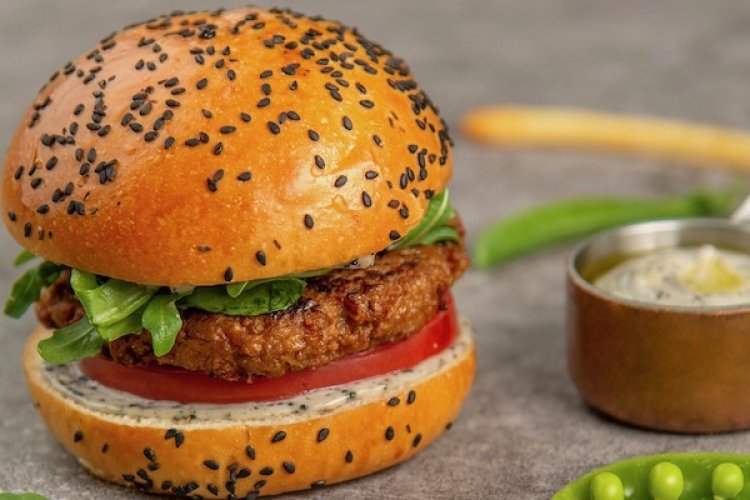Veg-Jing Out: 24-Hour Eatery Jin Ding Xuan Partners With Beyond Meat, and Alternative (Meat) Facts About China
Veg-Jing Out: Your semi-regular guide to a guilt-free lifestyle in the capital.
24-hour eatery adds Beyond Meat to menu
24-hour Cantonese chain Jin Ding Xuan recently announced that they will be adding beef from US-based alternative meat producer, Beyond Meat, to the menu at all 18 of their Beijing locations. While it’s not entirely clear when the new dishes will be available, they have been revealed and include a red quinoa salad, steamed meatloaf with salted egg yolk, nutty chili pork dices, fried stuffed lotus root, cheese meatballs, west lake beef soup, Yibin burning noodles, and meat froth baked cake.
Back in 2019, the Global Times reported that Jin Ding Xuan had inked a deal with local company Zhenmeat, which was going to provide faux-meat fillings for their dumplings and dim sum, however, by all accounts, it appears that relationship never came to pass. Then, last September, they were supposed to have been working with Chinese startup, Vesta Food Lab, on a research and development project for mushroom-based meat alternatives. This too seems to have been a failed venture – or perhaps something that’s still in the works.

Nevertheless, for those who follow this column, over the past few months nary a week has gone by without some restaurant or other adding plant-based options to their menu. From Burger King to Ikea, from KFC to Dicos, Beijing’s vegetarian and veg-curious communities have been spoiled for choice. However, those new options have largely been confined to international fast-food chains, bolstered by a few Western and fusion establishments such as Q Mex and the current offerings at Mona Bar pop-up, Take Your Veggie. As a result, when it comes to Chinese food options for the meat-averse, not much has changed, with the majority of choices still being Buddhist temple restaurants and a few other dependable spots like Vege Tiger and Bestease. Hopefully, however, in the wake of Jin Ding Xuan’s menu additions, we will see a new wave of local eateries hopping on the plant-based train.
Nestlé opens flagship vegan store on Tmall
For those of you who would rather cook at home, last month, evil food ogre Nestlé launched a new line of frozen vegan products, dubbed Harvest Gourmet, which are available from their flagship store on Tmall and Taobao. Likewise, there are plans to enter the brick-and-mortar market via Hema stores in Beijing and Shanghai later this year.

According to a statement from Nestlé, the company has spent the last three decades perfecting its approach to plant-based meat, such that their technology combines “a deep understanding of Chinese consumers and their culinary needs” (how thoughtful!), The result: burgers, sausages, nuggets, minced pork, braised meatballs, pork belly, a spicy wok mix, and kung pao chicken.
On some level, we applaud any company attempting to curb humanity’s unsustainable appetite for meat. However, when that company is considered “one of the most hated companies in the world,” we can’t help but roll our eyes. All of which is to say, if you really want to get your hands on some vegan products to cook at home, there’s plenty of other plant-based vendors on Taobao that operate according to less shady business practices.
Alternative (meat) facts about the Chinese market
If it hasn’t become entirely clear yet, there’s a growing demand for alternative proteins in China. Admittedly, we are but a humble lifestyle brand, doing our best to identify trends in and around Beijing, so don’t take our word for it. But according to a new study by IPSOS, China's taste for vegan meat is expected to increase by 200 percent over the next four years, bringing its total market value to around USD 1.7 billion. Now, it’s worth pointing out that the above study was commissioned by DuPont Nutrition & Biosciences, a company that, among other things, is a producer of vegan food products and plant-based proteins itself. Which is to say, any time a study that turns up astonishing and favorable data was commissioned by a company with a vested interest in that data, it’s completely natural to be a bit skeptical. Having said that, given the rate at which plant-based options are springing up in the capital and the rest of China, we’re willing to bite.

So what exactly did IPSOS and DuPont find? Well, for starters, of Asia Pacific’s 4.3 billion person population – which happens to be about 60 percent of the world’s population – more than one-third, or 36 percent, of folks are already consuming a low or no-meat diet. What’s more, of the APAC consumers surveyed, 75 percent are “willing to pay a similar price to meat for plant-based alternatives” (no big surprise there). And while 83 percent of respondents view protein as the most important ingredient (in a meal, we suppose? It’s not entirely clear), 78 percent of them also believe that “plant-based meat alternatives are here to stay, and consumption of plant-based products will continue to grow in the future.” When you run a company that traffics in plant-based proteins, this is some seriously valuable data. Okay, okay. So that covers APAC, but what about China specifically? Tell us more about that.
“In China, plant-based meats are increasingly on-trend with celebrity endorsements and links to health and sustainability.” Cool.
All jokes aside, however, the rapidity with which China’s citizenry is taking to a plant-based diet could be down to a 2016 directive from the government in which they recommended lower levels of meat to stave off an increasing number of diabetes and cardiovascular diseases. That, coupled with the coronavirus outbreak, has led more and more Chinese folks to carefully consider what they consume. Speaking to Live Kindly earlier this week David Yueng, the CEO and founder of Green Monday – a Hong Kong-based organization that promotes plant-based living – as well as OmniFoods – the company behind the vegan OmniPork products – explained that, “We are seeing an acceleration of demand in Asia towards plant-based food as the general public has a growing concern regarding the environmental impact and sustainability of the livestock industry,” adding, “And they are now seeking safer and healthier alternatives in the wake of the COVID outbreak.”
Images: Beyond Meat China, Green Queen
Related stories :
Comments
New comments are displayed first.Comments
![]() Sikaote
Submitted by Guest on Sun, 01/24/2021 - 08:45 Permalink
Sikaote
Submitted by Guest on Sun, 01/24/2021 - 08:45 Permalink
Re: Veg-Jing Out: 24-Hour Eatery Jin Ding Xuan Partners With...
...if you really want to get your hands on some vegan products to cook at home, there’s plenty of other plant-based vendors on Taobao that operate according to less shady business practices.
Thanks for the free advertising. Very thoughtful of you.
Sincerely,
Nestle Corp. Marketing Department
![]() Sikaote
Submitted by Guest on Sun, 01/24/2021 - 08:41 Permalink
Sikaote
Submitted by Guest on Sun, 01/24/2021 - 08:41 Permalink
Re: Veg-Jing Out: 24-Hour Eatery Jin Ding Xuan Partners With...
...will be adding beef from US-based alternative meat producer, Beyond Meat,...
Which is it? Beef or non-beef? Asking for a friend.

Validate your mobile phone number to post comments.







